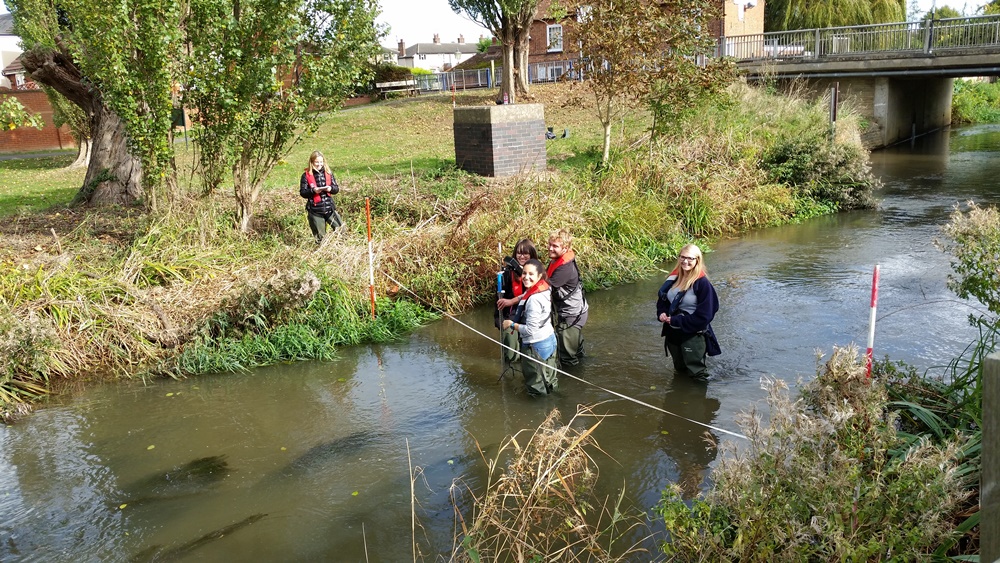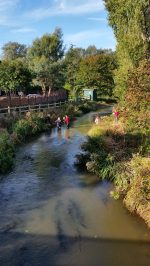Flexible courses required for evolving challenges in water management
06/12/2016

Today’s environmental water managers must have a thorough understanding of a wide range of topics (from hydraulics to policy and ecology to water resources) and an arsenal of analytical tools with which to tackle them. At Cranfield University, we have been educating the next generation of managers, consultants and scientists for more than 30 years through our water management courses. The constant evolution of the sector, though, means that our courses must adapt regularly to new concepts and technologies. This academic year, we relaunched our Environmental Water Management MSc course with new and refreshed modules, with the continued industrial links for which Cranfield is famous.
New Environmental Water Management MSc
This course has two new modules. The first, Drought and Water Scarcity, explores water resource allocation in a changing climate. It is led by researchers who helped to secure the University’s 2016 Queen’s Anniversary Prize (for irrigation, and community water and sanitation), and who are working closely with industry on UK research council funded projects.
The second module, Water in Cities, examines how we currently handle water and wastewater in built-up areas, and highlights the future trends in urban water management and water sensitive urban design. This modules calls on the expertise of Cranfield Water Science Institute’s drinking water and wastewaters experts and key external speakers.
These two new modules join several redesigned ones, including Catchment Water Quality and Integrated River Basin Management, which in combination provide graduates with the strong foundation they need for their future careers.

Working with industry on real-world group projects
Cranfield University is known for working closely with industry to deliver high impact science and engineering solutions. As the UK’s only exclusively postgraduate university, students get the unique experience to work with researchers whose primary purpose is to understand the needs of their sector. This is most evident in the group project, a unique component of a Cranfield MSc, in which students work for a real client over a 10 week periods. Teams of 6-8 students from a range of MSc courses work together on a consultancy project, handling all stages of project design and delivery from initial meetings to scope out the work to the final report and presentation.
This is a challenging but highly rewarding exercise that gives students first-hand experience of working in an environmental or engineering consultancy, as well as with professionals from different disciplines. Topics vary yearly as they respond to the needs of our industrial partners, but recent projects have been on natural flood risk management, hydromorphological assessments, and internet-of-things water quality monitoring networks.
Cutting-edge science and industrial research
Students can continue to work with industry for their individual thesis projects, or can align their project with our ongoing RCUK, European Commission or industry research. Students in the Environment Water Management course have their choice of a wide range of topics, all of which provide them with fundamental research experience and transferable skills in project management and delivery.
For an idea of what an MSc thesis is like at Cranfield, see Jessica Fennel’s blog. Her research on the Weston Turville Reservoirs SSSI shows how new science can be done through collaborations with industry, in this case the Canal and River Trust who are entrusted with the upkeep of the 2,000 miles of canal network in England and Wales.
As the Course Director for Environmental Water Management, I am always excited about the start of a new term, but even more so this year with our newly revamped course. Whether you are looking to advance your studies as a student, or to work with Cranfield as an industrial partner to help train the next generation of water managers, please get in touch to learn more.
Categories & Tags:
Leave a comment on this post:
You might also like…
Keren Tuv: My Cranfield experience studying Renewable Energy
Hello, my name is Keren, I am from London, UK, and I am studying Renewable Energy MSc. My journey to discovering Cranfield University began when I first decided to return to academia to pursue ...
3D Metal Manufacturing in space: A look into the future
David Rico Sierra, Research Fellow in Additive Manufacturing, was recently involved in an exciting project to manufacture parts using 3D printers in space. Here he reflects on his time working with Airbus in Toulouse… ...
A Legacy of Courage: From India to Britain, Three Generations Find Their Home
My story begins with my grandfather, who plucked up the courage to travel aboard at the age of 22 and start a new life in the UK. I don’t think he would have thought that ...
Cranfield to JLR: mastering mechatronics for a dream career
My name is Jerin Tom, and in 2023 I graduated from Cranfield with an MSc in Automotive Mechatronics. Originally from India, I've always been fascinated by the world of automobiles. Why Cranfield and the ...
Bringing the vision of advanced air mobility closer to reality
Experts at Cranfield University led by Professor Antonios Tsourdos, Head of the Autonomous and Cyber-Physical Systems Centre, are part of the Air Mobility Ecosystem Consortium (AMEC), which aims to demonstrate the commercial and operational ...
Using grey literature in your research: A short guide
As you research and write your thesis, you might come across, or be looking for, ‘grey literature’. This is quite simply material that is either unpublished, or published but not in a commercial form. Types ...






